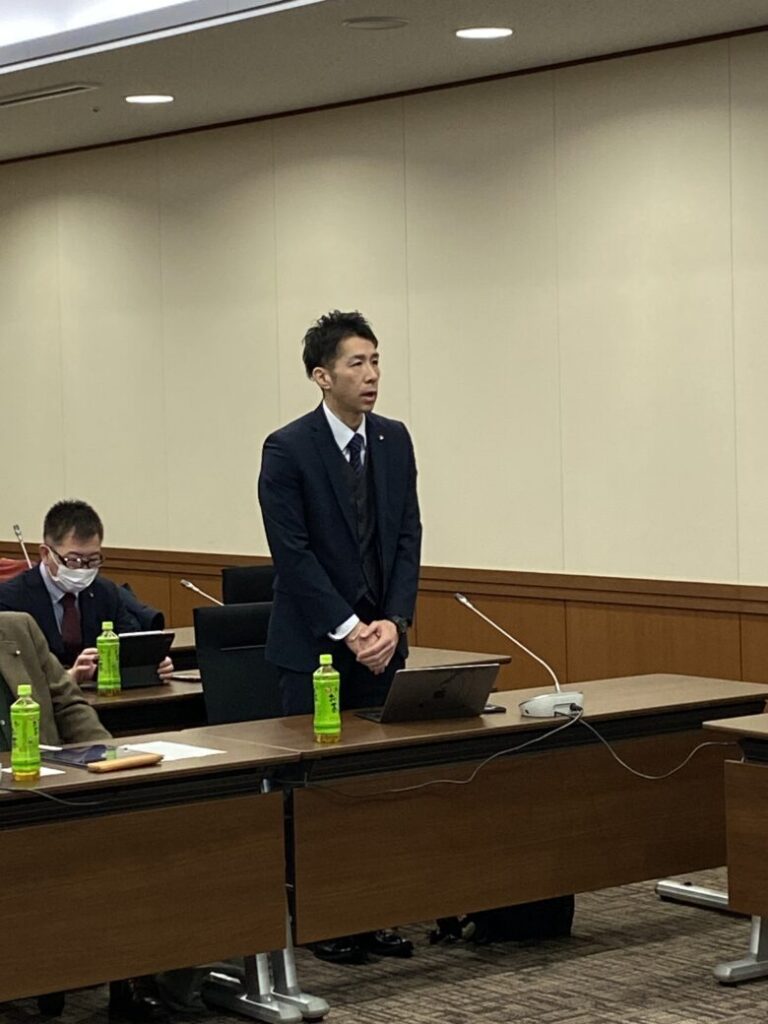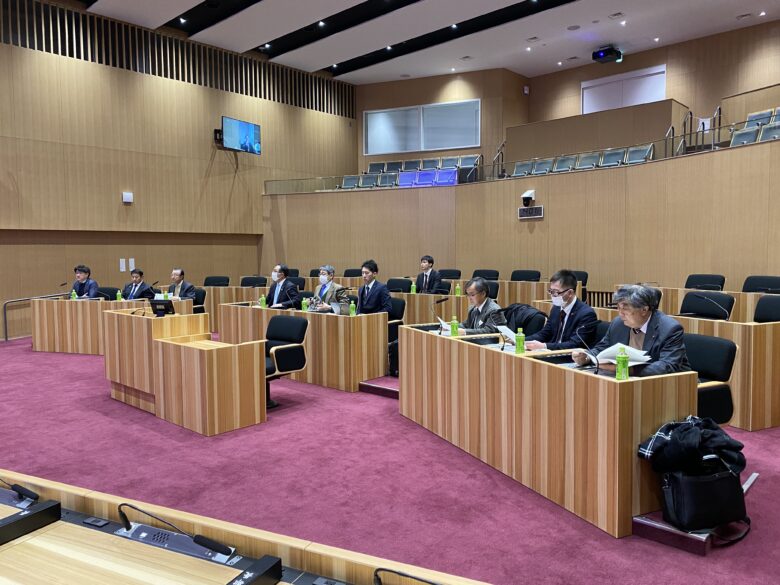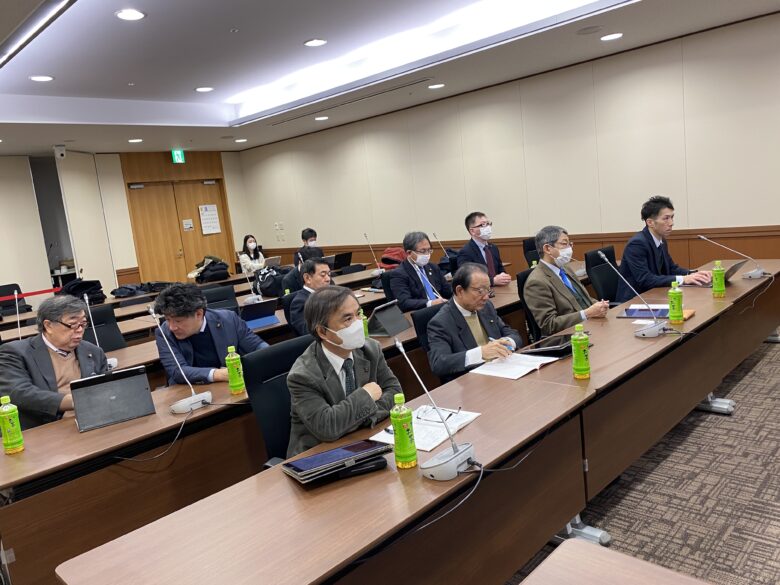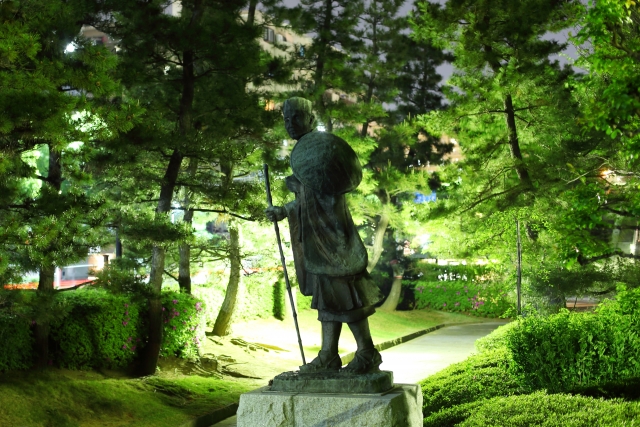2024年(令和6年)1月25日から26日の一泊二日の行程で、埼玉県草加市役所と茨城県つくば市役所を議会運営委員会のメンバーで行政視察してきました。
草加市では「議会改革の取組について」、つくば市では、「つくば市議会業務継続計画(議会BCP)について、オンラインによる一般質問の実施について」の説明を受け質疑応答の後に、議場の見学を行なってきました。
草加市では、過去に政務活動費の不適切な使用などがあったため、議会改革に取り組んだ経緯があり、継続的に議会改革に取り組んでいる。注目した点は3点ありました。
①庁舎を2023年3月に新しくしたばかりで、新議場への移転に伴い、「しゃべれる傍聴席」という個室の傍聴席を作ったこと。防音個室で、大きな声で話しても全く議場側に音は漏れませんでした!これはとても面白い取組でした。
②市議会における災害発生時の対応要領を作成したこと。ただし、これは議会BCPというレベルのものではなく、非常時の議員の連絡体制について、を定めた。
③議会だより(広報紙)の工夫。題字(習字による手書き)を、市内の中学生に持ち回りで書いてもらっている。また、夏休み議会見学会を開いて議場を見に来てもらっている。
つくば市では、過去に発生した東日本大震災・国内最大級の竜巻の災害や感染症の発生や対応を教訓に、議会及び議員の役割について、明確な行動指針を定めることにしたそうです。注目した点は5点ありました。
①かなりしっかりとした内容で、市議会業務継続計画(議会BCP)を策定されていたこと(尽力された市議自ら説明してくださり、かなり大変だったとおっしゃられておりました)
②市政報告を行う際に、議会カフェ(意見交換)というWSスタイルで行なっていること。
③反問権の制定を行なったこと。
④つくば市議会チャンネルを作って発信をしていること。映像編集が得意な市議が1人で作成しているとのことでした。
⑤オンライン参加で一般質問を行なったこと。審議はできないが、一般質問は法律の定めがないため、条例や会議則、要綱に定めること、ただし欠席扱い、という総務省通知により条例を制定したこと。議事録には、「欠席議員(オンライン出席議員)」という記載になるが、会議録に発言は書かれる。
どちらも、非常に勉強になって、とても充実した視察だったなぁと思いました。ただし、秋田市議会で議会条例を定める議会改革を行うのは、議員の多数が賛成しないといけないため難しいかなと感じました。せめて、草加市で作られた市議会における災害発生時の対応要領と同等のものは早急に整備した方がいいと感じました。




【English】
I participated in an administrative inspection tour to Soka City and Tsukuba City organized by the Council Management Committee.
From January 25th to 26th, 2024, as part of a one-night, two-day itinerary, we visited the Soka City Hall in Saitama Prefecture and the Tsukuba City Hall in Ibaraki Prefecture as members of the Council Management Committee to conduct an administrative inspection.
In Soka City, we received explanations about “efforts for parliamentary reform,” while in Tsukuba City, we learned about the “Tsukuba City Council Business Continuity Plan (BCP)” and the implementation of online general questioning. Following the question-and-answer sessions, we toured the council chambers in both cities.
In Soka City, they have been working on parliamentary reform due to past incidents of inappropriate use of political activity funds. Three key points drew our attention:
- They recently relocated to a new council chamber in March 2023 and created “soundproofed observation seats” as part of the move. These individual soundproof booths allowed people to speak loudly without disturbing the council chamber, which was quite an interesting initiative.
- They established response guidelines for disasters occurring during city council sessions. However, this was not at the level of a council BCP but rather outlined the emergency contact system for council members.
- They made innovative changes to their council newsletter by having junior high school students in the city take turns writing the headlines in calligraphy (handwriting). They also organized summer vacation council tours for people to visit the council chambers.
In Tsukuba City, they decided to establish clear guidelines for the roles of the council and council members based on the lessons learned from past disasters such as the Great East Japan Earthquake and the largest tornado in Japan, as well as infectious disease outbreaks. We noted five key points:
- They had developed a very comprehensive City Council Business Continuity Plan (BCP), with dedicated council members explaining the details and expressing how challenging it had been.
- They conducted city policy reports in a workshop-style “Council Café” for exchanging opinions.
- They established the right to ask questions in response to inquiries.
- They created the Tsukuba City Council Channel for communication. It was mentioned that one council member proficient in video editing was responsible for its creation.
- They conducted general questioning online. Although deliberations were not possible, as there was no legal provision for general questioning, they established regulations in accordance with a notice from the Ministry of Internal Affairs and Communications, stating that it would be treated as an absence but the comments would be included in the meeting minutes.
Both visits were extremely educational and fulfilling. However, I felt it might be challenging to carry out parliamentary reforms and establish council ordinances in Akita City without the majority of council members’ support. At the very least, I believe it would be beneficial to promptly develop an emergency response plan for the Akita City Council, similar to the one established in Soka City.
【Español】
Participé en una gira de inspección administrativa a las ciudades de Soka y Tsukuba, organizada por el Comité de Gestión del Consejo.
Del 25 al 26 de enero de 2024, como parte de un itinerario de una noche y dos días, visitamos el Ayuntamiento de Soka en la prefectura de Saitama y el Ayuntamiento de Tsukuba en la prefectura de Ibaraki como miembros del Comité de Gestión del Consejo para llevar a cabo una inspección administrativa.
En Soka, recibimos explicaciones sobre “esfuerzos para la reforma parlamentaria”, mientras que en Tsukuba, nos informaron sobre el “Plan de Continuidad de Negocios del Consejo de la Ciudad de Tsukuba (BCP)” y la implementación de preguntas generales en línea. Después de las sesiones de preguntas y respuestas, realizamos un recorrido por las cámaras del consejo en ambas ciudades.
En Soka, han estado trabajando en la reforma parlamentaria debido a incidentes pasados de uso inapropiado de fondos de actividad política. Tres puntos clave llamaron nuestra atención:
- Recientemente se trasladaron a una nueva sala del consejo en marzo de 2023 y crearon “asientos de observación insonorizados” como parte del traslado. Estas cabinas individuales insonorizadas permitían que las personas hablaran en voz alta sin perturbar la sala del consejo, lo cual fue una iniciativa bastante interesante.
- Establecieron pautas de respuesta para desastres que ocurrieran durante las sesiones del consejo municipal. Sin embargo, esto no fue a nivel de un BCP del consejo, sino que más bien delineaba el sistema de contacto de emergencia para los miembros del consejo.
- Realizaron cambios innovadores en su boletín del consejo al hacer que estudiantes de secundaria en la ciudad se turnaran para escribir los titulares en caligrafía (escritura a mano). También organizaron recorridos por el consejo durante las vacaciones de verano para que la gente visitara las cámaras del consejo.
En Tsukuba, decidieron establecer pautas claras para los roles del consejo y los miembros del consejo basados en las lecciones aprendidas de desastres pasados como el Gran Terremoto del Este de Japón y el tornado más grande de Japón, así como brotes de enfermedades infecciosas. Notamos cinco puntos clave:
- Habían desarrollado un Plan de Continuidad de Negocios del Consejo de la Ciudad (BCP) muy completo, con miembros del consejo dedicados explicando los detalles y expresando lo difícil que había sido.
- Realizaron informes de políticas de la ciudad en un estilo de taller de “Café del Consejo” para intercambiar opiniones.
- Establecieron el derecho a hacer preguntas en respuesta a las consultas.
- Crearon el Canal del Consejo de la Ciudad de Tsukuba para la comunicación. Se mencionó que un miembro del consejo con habilidades en edición de video era responsable de su creación.
- Realizaron preguntas generales en línea. Aunque no se podían realizar deliberaciones, ya que no había disposiciones legales para preguntas generales, establecieron regulaciones de acuerdo con un aviso del Ministerio de Asuntos Internos y Comunicaciones, que indicaba que se trataría como una ausencia pero los comentarios se incluirían en las actas de la reunión.
Ambas visitas fueron extremadamente educativas y satisfactorias. Sin embargo, sentí que podría ser difícil llevar a cabo reformas parlamentarias y establecer ordenanzas del consejo en la Ciudad de Akita sin el apoyo de la mayoría de los miembros del consejo. Al menos, creo que sería beneficioso desarrollar rápidamente un plan de respuesta de emergencia para el Consejo de la Ciudad de Akita, similar al establecido en la Ciudad de Soka.

